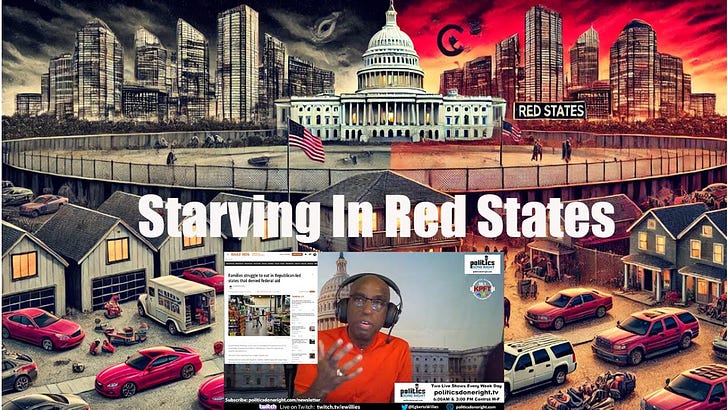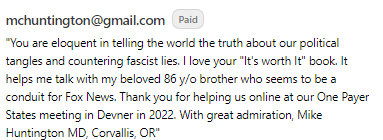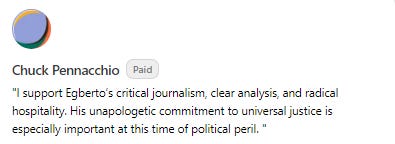Red States, poor due to conservative policies, starve their citizens by denying them federal aid.
States governed by Republicans using conservative policies refuse to take federal aid for their starving citizens even as their policies have made them the poorest states in the country.
A quick but important note before reading this prescient article
Our Paid Subscriber to Free Subscriber ratio is too low for long-term sustainability. WE NEED HUNDREDS MORE, especially in this political climate. Misinformation funded by the deep pockets of our Oligarchy floods the internet. We are using all our platforms on-air, online, and in publications to counter that. We ask that you invest the equivalent of less than a coffee to ensure we can keep doing this. Please invest in a Democracy that serves all of us by becoming a paid subscriber. It comes with many benefits.
Red States Starve Their Citizens
The persistent narrative that red states, governed by conservative policies, consistently rank among the poorest in the United States has become a point of contention in American political discourse. Despite receiving significant amounts of federal aid, many of these states still grapple with high poverty rates, poor healthcare outcomes, and substandard education systems. The paradox of red states relying heavily on federal assistance while promoting anti-government rhetoric becomes even more stark when these states actively deny federal aid meant to alleviate poverty and improve living standards. This denial of aid, particularly in healthcare and social services, contributes to a vicious cycle of poverty and underdevelopment, effectively starving their citizens of essential resources.
Please listen to the entire video segment in this post, which I did on my KPFT 90.1 FM show Politics Done Right. Most importantly, please share with your progressive and conservative friends, family, and acquaintances.
Conservative policies in red states often emphasize limited government intervention, lower taxes, and reduced spending on social services. While championed as pathways to economic freedom and individual responsibility, these principles have frequently resulted in underfunded public services and weakened social safety nets. For instance, states like Mississippi, Louisiana, and West Virginia consistently rank at the bottom regarding healthcare access, educational attainment, and median household income. These states also exhibit some of the country’s highest poverty and unemployment rates.
The refusal to expand Medicaid under the Affordable Care Act (ACA) serves as a prime example of how conservative policies have directly impacted the well-being of citizens in red states. As of 2024, twelve states, most of which are Republican-led, have still not expanded Medicaid. This decision has left millions of low-income individuals without access to affordable healthcare. A report by the Kaiser Family Foundation found that non-expansion states have significantly higher uninsured rates than states that expanded Medicaid. The uninsured are more likely to delay or forgo necessary medical care, resulting in worse health outcomes and higher medical costs in the long run.
The denial of federal aid extends beyond healthcare. Many red states have also turned down federal funds for unemployment benefits, food assistance, and education. For example, during the COVID-19 pandemic, several Republican governors opted to terminate federal unemployment benefits early, arguing that these benefits disincentivized work. However, this decision ignored the reality that many unemployed individuals struggled to find jobs in a contracting economy, leading to increased financial hardship and food insecurity.
Education is another critical area where conservative policies have had detrimental effects. Red states often allocate less funding per student than blue states, resulting in larger class sizes, outdated textbooks, and insufficient teacher resources. The reluctance to accept federal education grants further exacerbates these issues. For instance, states like Texas and Florida have refused federal funds for public school improvements, citing concerns over federal overreach. This has led to a decline in the quality of education, particularly in low-income and rural areas, perpetuating cycles of poverty and limiting economic mobility.
The economic policies favored by conservative leaders in red states also contribute to income inequality and stagnation. Lower tax rates on corporations and the wealthy and limited regulations are often touted as strategies to attract businesses and stimulate growth. However, these policies frequently result in reduced state revenues, forcing cuts to essential services that disproportionately affect low-income and marginalized communities. The benefits of such tax cuts rarely trickle down to the working class, leading to more significant income disparity and economic instability.
Despite the clear evidence that conservative policies often fail to deliver the promised economic prosperity, the political rhetoric in red states remains steadfastly anti-government and pro-small government. This ideological rigidity not only hampers the ability of these states to address pressing social and economic issues but also perpetuates a cycle of poverty and deprivation. By denying federal aid and underfunding public services, red state governments effectively starve their citizens of the resources needed to improve their lives and break free from poverty.
The persistent refusal to accept federal aid, coupled with conservative economic policies, has dire consequences for the citizens of red states. The lack of access to healthcare, education, and social services undermines the quality of life and hinders long-term economic growth and stability. To break this cycle, policies must shift towards the well-being of all citizens, ensuring that federal aid is utilized effectively to address the root causes of poverty and inequality.
The paradox of red states’ dependence on federal aid while espousing conservative, anti-government policies highlights the dishonesty, moral depravity, and detrimental impact of such ideologies on the most vulnerable populations. By denying federal aid and underfunding essential services, red state governments perpetuate poverty and deprivation, ultimately starving their citizens of the opportunities needed to improve their lives. A re-evaluation of these policies and a commitment to equitable resource distribution are essential to break this cycle and promote all citizens’ overall well-being and prosperity.
The solution is clear. The populace must be informed about the real genesis of their problems. More importantly, they must elect progressives at every level of government who prioritize the working class, the largest stakeholder in our economy. If the working class does well, the entire nation does well.
Viewers are encouraged to subscribe and join the conversation for more insightful commentary and to support progressive messages. Together, we can populate the internet with progressive messages that represent the true aspirations of most Americans.
Can we count on your help to reach our goal of 100 new paid subscriptions by the end of the month?
The other side has big donors and everyday citizens who invest heavily in platforms that lie and misinform. All we have is you. So, please invest in our media outlet by clicking the subscribe button below to become a paid subscriber. You won’t miss that coffee, but it will make a difference in our politics as we spread the truth about our policies and progressive politics. All paid subscribers get to read my five books on this platform and all subsequent books I write. They will also be privy to subsequent incentives.







